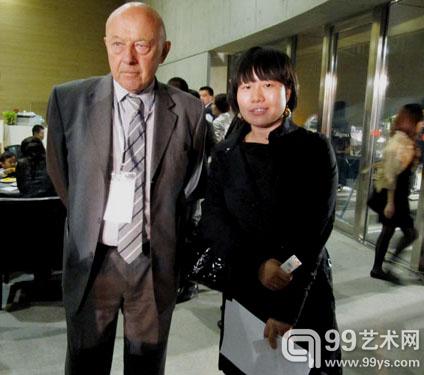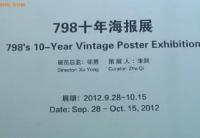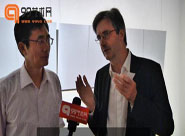约翰•图萨爵士:他们认为贵或者时尚,他们就会买

约翰•图萨爵士(Sir John TUSA ) 英国伦敦艺术大学主席、大英博物馆董事

99艺术网记者与约翰•图萨爵士
采访人:丁晓洁(99艺术网)
时间:2009年10月
地点:中央美术学院美术馆
翻译:周茉
99艺术网:西方收藏家在选择中国当代艺术作品时的标准是什么?
约翰•图萨爵士:我认为绝大多数收藏家买和其他收藏家一样的作品。如果他们认为贵或者时尚,他们就会买。不是很多收藏家买他们真正认为好的或他们喜欢的作品。
99艺术网:您认为中国当代艺术和欧洲当代艺术在发展上有什么区别?
约翰•图萨爵士:中国当代艺术最多发展了二十至三十年,中国当代艺术的商业部分则只有十至十五年的历程,而欧洲当代艺术有一百多年的历史。这是一个很大的区别。欧洲的市场更大一些,有更多的艺术家和艺术流派。欧洲的艺术发展历程更长一些,这是主要区别,而这并不代表欧洲比中国强。
99艺术网:随着经济、文化全球一体化的深入,您认为中国和西方在交流与对话上存在着什么问题?
约翰•图萨爵士:我认为欧洲和西方人对中国了解的还甚少,今天会议上的每个人也都告诉我大部分中国人对欧洲(欧洲的艺术,政治,文化)的了解也很少。双方都还有很多要互相了解的。也许现在只是交流进程的一个开端,双方都对对方了解很少。我们知道毛主席和文化大革命,知道二十世纪的中国,但我们不了解十五,十六,十七世纪的中国,同样中国人也不了解欧洲。
Ding Xiaojie: What is the criteria for western collectors to choose among China’s contemporary art works?
Sir John TUSA : I think most collectors buy what other collectors are buying. If they think it is fashionable and expensive, they would buy it. Not many collectors buy something because they really believe it’s good or they like it.
Ding Xiaojie: What do you think is the difference between the development of Asian’s contemporary art and Europe’s?
Sir John TUSA : Well, Chinese contemporary art has been developed over twenty or thirty years at the maximum, the commercial part of Chinese contemporary art is maybe only ten to fifteen years old, and European modern art is more than a hundred years old. So that is a huge difference. And also it is a much larger market, there are many more artists, there are many more art schools. So Europe has been doing it for very much longer. That’s the main difference. It doesn’t mean to say what Europe does is better, but just Europe has been doing it for very much longer.
Ding Xiaojie: With the gradual deep-going of the global integration of the economy and culture, what kind of problems do you think exist in the communication and dialogue between China and the west?
Sir John TUSA : I think that people in the west, in Europe are still quite ignorant about China, and everybody has told us today at the conference that most Chinese know very little about Europe, and European art, European politics, and European culture. So there are lots to be learned on both sides. Maybe now, this is only the start of a process of communication, but each side is very ignorant. What we know about China, we know about Chairman Mao and the Cultural Revolution, we know about China in the 20th Century, we don’t know much about China in the 50th, 60th, 70th, Century, and the Chinese also don’t know about Europe.
【编辑:丁晓洁】

